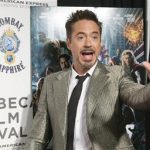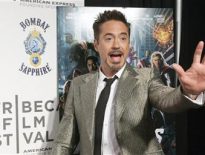(Reuters) – At 74, revered U.S. stage and film actor Frank Langella has little trouble finding interesting roles.

Four years on from his Oscar best-actor nomination for “Frost/Nixon”, Langella’s latest acting feat sees him starring in the quirky comedy drama “Robot & Frank” as a suave former cat burglar opposite a robot sent by his children to look after him.
Langella joked to Reuters that he has acted opposite far more wooden actors than robots, and in turn offered thoughts on Hollywood and how he hopes one day soon to wear heels. “Robot & Frank” opens in New York on Friday and expands nationwide next week.
Q: This is director Jake Schreier’s first film. Do you agree to do a film like this only if the director leaves you alone?
A: “You could say that about some very famous directors, but I agree to do a film first on what’s on the page. There is an old expression – and I started out in the theater and go back to the theater every year if I can – the expression is, ‘If it ain’t on the page, it ain’t on the stage.’ I once did a play in England, and the venerable old actress Joan Plowright walked into my dressing room with a very strange look on her face and I knew the evening didn’t work and she said, ‘I know what you are thinking, dear, you were thinking, I will fix it in rehearsal. But you can’t. If it’s not there, you can’t. You need the words.'”
Q: But are these first-time directors fearful at all of you?
A: “Yes, completely. And you have to walk that line. You can’t ever say to a young director, ‘This is the way to do it or this is the way we have always.’ You have to be rather excited at the notion of, ‘How is this man going to approach it and in what way is he going to talk to me and talk to other actors?’ You have to step back and let the kid get a little too close to the fire, and get a slight burn so they remember forever. I let the director do that with me a little bit and when he says something really, really awful, I kind of say, ‘No, I don’t think I will do that.’
“You are also lucky if you get a director who says, ‘Look, you’ve done 60 movies, tell me, am I this, am I that?’ And we (Schreier) had that rapport.”
Q: How did acting opposite a robot compare with the many other challenges you have had over the past dozens of films?
A: “It wasn’t difficult in the least, and I have acted opposite human robots a number of times. I have acted opposite actors, who, no matter what you do, do not change a flicker of their performance. They are in no way affected by you. Or I could have been a robot with some of them. I had very strong feelings about what I would be like if a robot was put into my life or if I were left alone with one.”
Q: What themes – aging, regret – most interested you?
A: “The most powerful reason I wanted to play the part and what I kept feeling as I was playing it, was about loss of control. I still have all my marbles. I am healthy. Knock on wood, I am feeling fine, I am vital. I don’t feel any diminishment. But in order for me to play Frank I had to give in to all of those feelings of what begins to happen to you in your seventies and what is happening to my contemporaries. Who doesn’t really want to drive anymore, who is scared to drive at night, who is afraid to be alone in the house, who can’t remember where they put their keys and then they find out that they are in the freezer. All that sort of thing is happening to my generation. To me the chief thing every day was the anger, and fear of beginning to lose control of things you absolutely took for granted all your life.”
Q: Your recent memoir, “Dropped Names”, was hailed as “satisfyingly scandalous” about Hollywood and stars from Bette Davis to Elizabeth Taylor. How has Hollywood changed?
A: “It hasn’t changed, except for ambition is still the same, insecurity is still the same, it’s still a provincial town and it is still a cesspool of very, very frightening and terrifying circumstances for young people who get off buses and come there. It is full of so much treachery and so much duplicity and so much lying. And yet at the same time, as you said, it is an extraordinary, exciting place to be when you do succeed.
“More days now actors are aspiring to star in a television series. We didn’t do that when we were young. We were very grand about it, we wanted to be theater stars. And everything else was secondary to that. But the theater now I don’t think is any longer a major ambition of most actors … so imagine the attrition rate in my profession. Staggering. Two percent, they say, two percent of the people who try, succeed.”
Q: What great role on stage would you play?
A: “There is a play that I have optioned, that I can’t tell the title of because I have to figure out who would be the right person to direct it, in which I would play a female. I have always wanted to play a female character. A really full-out female, so that is my next. People keep telling me I should do (King) Lear, but it doesn’t interest me. Where I am going to find a pair of size 14 high heels, I don’t know.”
(Editing by Jill Serjeant and Dale Hudson)





